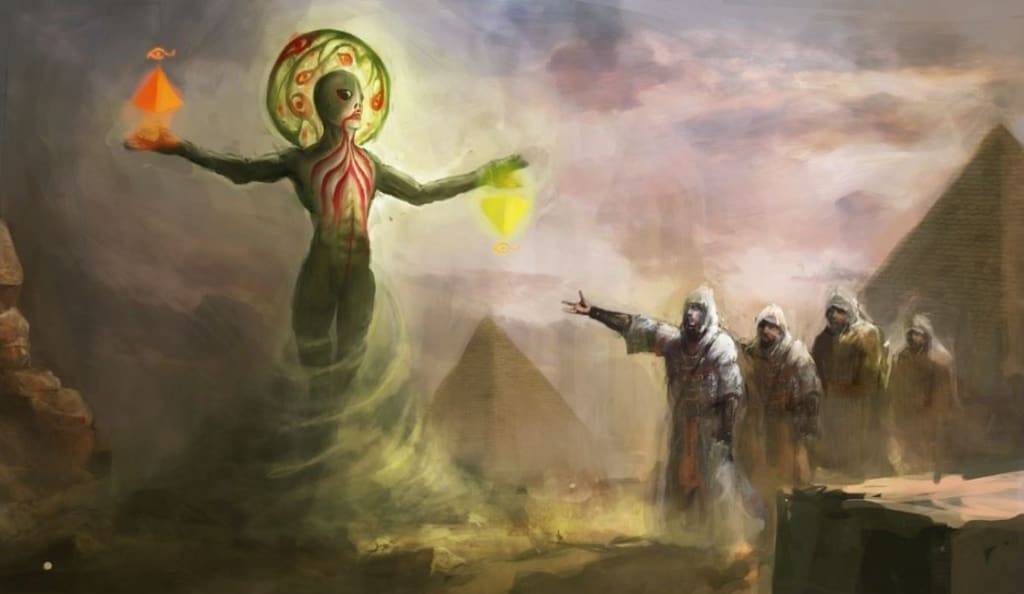Humanity has long grappled with the mysteries of its origin and the concept of divinity. For centuries, people have turned to religious beliefs to explain their existence, often rejecting alternative ideas about where humans came from or who—or what—may have shaped them. However, as scientific exploration advances and questions surrounding human uniqueness persist, the possibility that extra-terrestrial beings could have influenced our development has captured the imagination of many. Could our gods from ancient times have been visitors from other planets?
One key aspect of this theory stems from observing life on Earth. Nature is a finely tuned system where every species plays its role in maintaining balance. Species evolve, adapt, and contribute to the ecosystem, but humans appear to break from this pattern. Unlike other animals, humans often exploit natural resources without returning much to the environment, leading some to wonder: Are humans an anomaly within Earth's ecosystem? Could we have originated elsewhere?
This speculation leads to the notion that humans may have been introduced to Earth through extra-terrestrial intervention. According to this idea, scientists or intelligent beings from another world might have genetically modified early life forms or even seeded humanity on Earth. While it might sound far-fetched, this idea has ancient roots and echoes through religious texts and mythologies around the world.
The Bible, particularly the Old Testament, contains intriguing passages that have sparked debate. The prophet Ezekiel’s vision of a "chariot" descending from the sky has been interpreted by some as a possible extra-terrestrial encounter. Could such biblical descriptions of divine or supernatural encounters actually be accounts of contact with alien beings? This theory suggests that early humans may have misunderstood these advanced visitors, revering them as gods.
This idea isn't limited to religious texts. Ancient structures like the pyramids of Egypt, Stonehenge in England, and the mysterious legends of Atlantis continue to baffle modern scholars. These monumental feats of engineering seem too advanced for the civilizations of the time to have created on their own. Some suggest that these structures may be evidence of extra-terrestrial influence—proof that beings with advanced technology once walked among early humans, sharing their knowledge.
The connection between ancient civilizations and potential alien influence is reinforced by the recurring theme of sky gods or beings descending from the heavens in myths from around the world. Many cultures, from the ancient Egyptians to the Mayans, have stories of gods arriving from the skies, bestowing wisdom, and then vanishing. These gods left behind not only awe-inspiring structures but also spiritual legacies that shaped religions and cultures for millennia.
As humanity continues its search for meaning and understanding, the idea of extra-terrestrial involvement in our past has gained renewed interest. With advancements in space exploration and science, what once seemed like the stuff of fantasy now feels more plausible. Researchers are increasingly open to the idea that life may exist elsewhere in the universe, and if so, it raises the possibility that alien civilizations could have visited Earth in the distant past.
The notion that we could one day become the "gods" of another species adds another layer to this debate. If we, as humans, possess the ability to explore and even colonize distant planets, might we also plant the seeds of life on those worlds? Could the same process that may have brought humans to Earth be repeated in the future, with us in the role of creators or gods for other species?
In conclusion, while the question of whether aliens were our gods in the past remains speculative, it invites us to reconsider long-held assumptions about our origins. The boundaries between myth, religion, and science continue to blur as we explore the cosmos and uncover new evidence about the universe and our place in it. Perhaps the answers to humanity's oldest questions are not just found in ancient texts or space but in the intersection of the two. As we venture further into the stars, we may discover that our gods were not divine beings, but visitors from other worlds.




No comments yet
Be the first to share your thoughts!